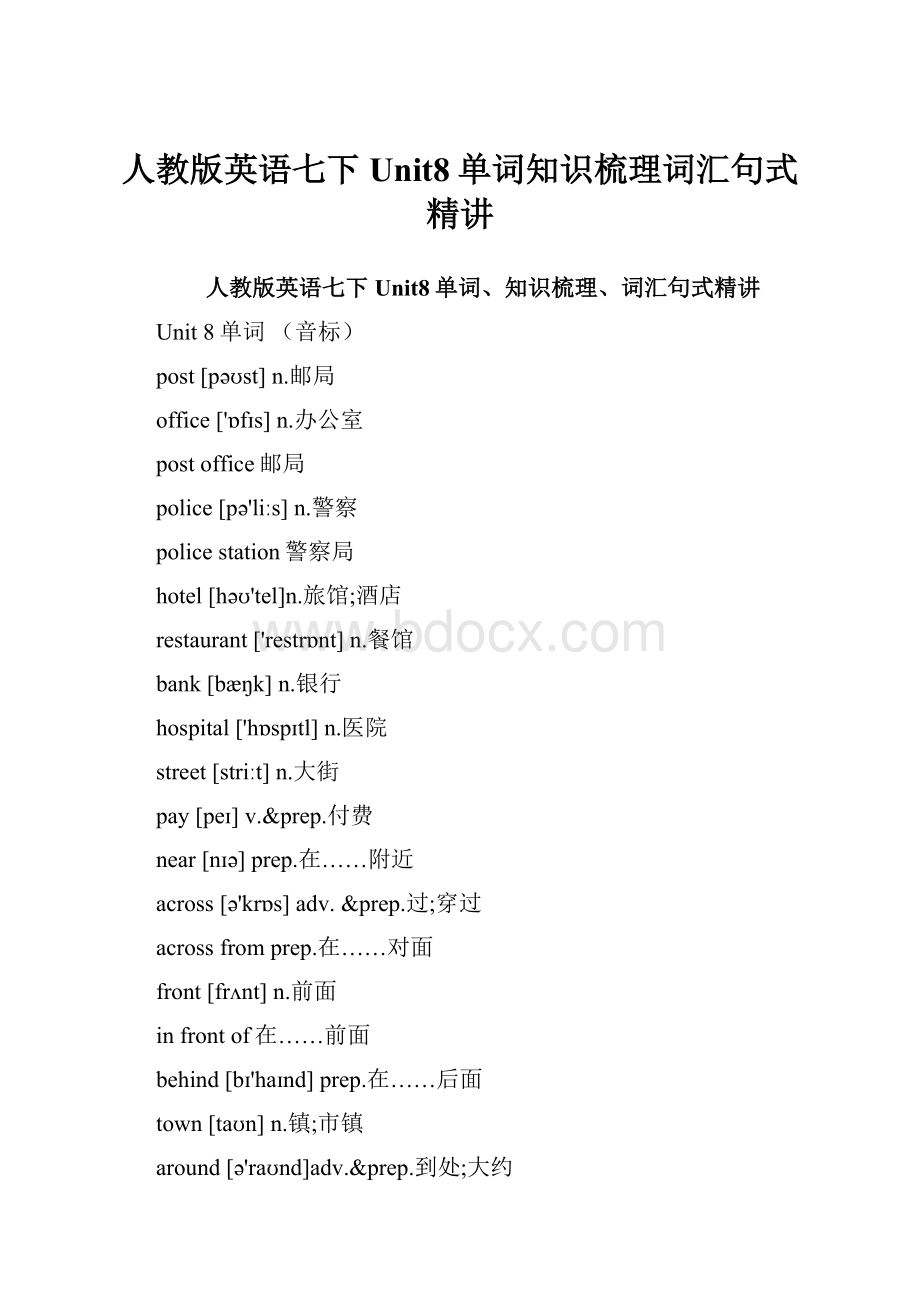人教版英语七下Unit8单词知识梳理词汇句式精讲.docx
《人教版英语七下Unit8单词知识梳理词汇句式精讲.docx》由会员分享,可在线阅读,更多相关《人教版英语七下Unit8单词知识梳理词汇句式精讲.docx(17页珍藏版)》请在冰豆网上搜索。

人教版英语七下Unit8单词知识梳理词汇句式精讲
人教版英语七下Unit8单词、知识梳理、词汇句式精讲
Unit8单词(音标)
post[pəʊst]n.邮局
office['ɒfɪs]n.办公室
postoffice邮局
police[pə'liːs]n.警察
policestation警察局
hotel[həʊ'tel]n.旅馆;酒店
restaurant['restrɒnt]n.餐馆
bank[bæŋk]n.银行
hospital['hɒspɪtl]n.医院
street[striːt]n.大街
pay[peɪ]v.&prep.付费
near[nɪə]prep.在……附近
across[ə'krɒs]adv.&prep.过;穿过
acrossfromprep.在……对面
front[frʌnt]n.前面
infrontof在……前面
behind[bɪ'haɪnd]prep.在……后面
town[taʊn]n.镇;市镇
around[ə'raʊnd]adv.&prep.到处;大约
north[nɔːθ]n.北;北方adj.北方的
along[ə'lɒŋ]prep.沿着
goalong(thestreet)沿着(这条街)走
turn[tɜː(r)n]v.转向,翻
right[raɪt]adv.向右边;n.右边
left[left]adv.向左边n.左边
turnright/left向右/左转
crossing['krɒsɪŋ]n.十字路口
neighborhood['neɪbə(r)hʊd]n.街区;街坊
spend[spend]v.花(时间、金钱等)
spendtime花时间
climb[klaɪm]v.爬
road[rəʊd]n.路
often['ɒfn;'ɔːfn]adv.时时;经常
air[eə][er]n.空气
sunshine['sʌnʃaɪn]n.阳光
free[friː]adj.免费的
enjoy[ɪn'dʒɒɪ]v.享受;喜爱
enjoyreading喜欢阅读
easily['iːzəli]adv.容易地
money['mʌni]n.钱
Unit8知识梳理
【重点短语】
1.nearhere在这儿附近
2.postoffice邮局
3.policestation警察局
4.payphone付费电话
5.onBridgeStreet在桥街
6.acrossfrom在…对面
7.nextto…在…旁边
8.between...and...在…和…中间
9.infrontof…在……前面
10.behind…在…后面
11.onCenterStreet在中心街
12.farfrom…远离…
13.goalong沿着
14.turnright/left向右/左转
15.atthefirstcrossing在第一个十字路口
16.onone’sleft/right在某人的左边/右边
17.spendtime(in)doing花费时间做某事
18.watchsb.doingsth.看见某人正在做某事
19.looklike看起来像
20.lovethecleanairandsunshine喜爱清新的空气和阳光
21.thebestthings最好的事情
22.befree免费的
23.crossCenterstreet穿过中心街
24.havetodosth.不得不做某事
25.anoisyneighborhood喧闹的街区
26.gettothelibraryeasily很容易到达图书馆
27.enjoydoingsth.喜欢做某事
28.goshopping去购物
29.bebusy忙的
30.makethefoods做食物
【重点句型】
1.---Wherearethepayphones?
付费电话在什么地方?
---They’rebetweenthepostofficeandthelibrary.在邮局与图书馆之间。
2.HowcanIhelpyou?
需要我帮忙吗?
3.I’mnewintown.我新来此镇。
4.Togetthere,IusuallywalkoutandturnrightonBridgeRoad.
赛去那儿的话,我通常步行外出,在大桥路向右拐。
5.Thebestthingsinlifearefree!
生活中最美好的东西是免费的呀!
6.ItisveryquietandIenjoyreadingthere.图书馆很安静,我喜欢在那儿看书。
7.Turnrightatthefirstcrossingandtherestaurantonyourleft.
在第一个十字路口向右拐,饭馆就在你左边。
8.Thankyouverymuch.非常感谢。
9.You’rewelcome.不客气。
【写作话题】本单元以问路指路为话题,向他人问路或指路。
写作题目:
假设你叫李雷,这个星期天是你的生日,你准备在家举办一个生日聚会,聚会在六点钟开始。
你邀请了你的一些朋友参加,Susan也在其中,可她不知道去你家的路。
你家住在BridgeStreet,乘坐六路或八路公共汽车在BridgeStreet站下车,下车后直走,然后在第一个十字路口右拐,左边有一个邮局,你家就在邮局的对面,房子是红色的,很容易找到。
请根据所给信息给Susan写封邮件。
优秀满分范文:
DearSusan,
ThisSundayismybirthday.I’llhaveabirthdayatmyhome.Itstartsat6p.m..Wouldyouliketocome?
I’llasksomeofmyfriendstocome.
MyhomeisonBridgeStreet.YoucantakeaNo.6orNo.8bus,andgetoffonBridgeStreet.Gostraight,andthenturnrightatthefirstcrossing.Youcanseeapostofficeonyourleft.Myhomeisacrossfromthepostoffice.Itisaredhouse.Youwon’tmissit.
Yours,
LiLei
Unit8词汇讲解
1.acrossfrom
acrossfrom在……的对面;在……对过。
例如:
Thehospitalisacrossfromthesupermarket.
医院在超市的对面。
辨析:
across与through
across表示的是从某物的一边到另一边;指从表面上横过。
例如:
Sheranacrosstheroad.她从马路上跑过。
through表示从内部通过,有“穿过,透过”等意思。
例如:
Theywentthroughtheforest.他们穿过森林。
2.infrontof
infrontof是介词短语表示“在......前面”,of的后面经常用名词或者代词表示地点。
例如:
Mybrothersitsinfrontofmeinourclassroom.
在我们的教室里我弟弟坐在我的前面。
注意:
infrontof强调一个物体在另一个物体外部的前面。
inthefrontof强调一个物体在另一个物体内部的前面。
例如:
Thereisabigdeskinthefrontofourclassroom.
在我们教室里前面有一个大课桌。
Thereisabigtreeinfrontofourclassroom.
在我们教室前面有一棵大树。
3.free
(1)free形容词,意为“免费的”。
例如:
Hereisyourfreelunch.这是你的免费午餐。
Yourticketisfree.你的票是免费的。
(2)free作形容词还可以意为“自由的,有空的”。
Areyoufreetomorrow?
明天你有空吗?
Ihavesomefreetimeonweekends.
在周末我有些空闲的时间。
4.pay
(1)pay用作动词是“付款”的意思,经常和介词for连用表示“为......付款”。
例如:
Ipaid200Yuanforthatnewbike.
那辆新自行车花了我200元。
(2)pay用作名词是“工资、薪金”之意。
例如:
Hedoesn’tlikethejob,butthepayisgood.
他不喜欢那份工作,但是薪水很高。
5.around
(1)around作副词,意为“在四周,在周围”。
lookaround意为“朝四周看”。
例如:
Helookedaround,andsaidnothing.
他四周看了看,什么也没说。
Themoonmovesaroundtheearth.
月亮绕着地球转。
(2)around作介词,意为“在……附近,围绕”,常用词组:
“aroundtheworld/country”意为“世界/全国各地”;
“showsb.around”意为“带领某人参观”。
例如:
Theyshowedusaroundtheschool.
他们带领我们参观了学校。
6.turn
(1)turn做动词时,可以做行为动词也可以做连系动词。
做行为动词时,意为“转弯,转身,翻转,旋转”。
例如:
Turnleftattheendoftheroad.(行为动词)
在路的尽头左转。
Theleavesturnyellow.叶子变黄了。
(连系动词)
(2)turn还可以作名词,意为“轮流,顺序”。
例如:
It’syourturntocleantheroom.
轮到你打扫房间了。
7.enjoy
(1)enjoydoingsth.意为“喜欢做……”或者“做……很开心/很享受”。
其中的enjoy是动词,有“欣赏,享受,喜爱”等意思,后接名词、代词或动名词。
例如:
Peopleenjoythecity’squietstreet.
人们喜爱这个城市宁静的街道。
Ienjoylisteningtopopmusic.
我喜欢听流行音乐。
(2)enjoy常见的习惯用语还有enjoyoneself,意为“玩得开心,过得愉快”,和haveagoodtime同义。
例如:
Theyareenjoyingthemselves.=Theyarehavingagoodtime.
他们玩得很开心。
8.post
(1)post作名词,意为“邮件,邮递,邮筒(箱)”。
例如:
Therewasabigpostthismorning.今天邮件很多。
Pleasetaketheseletterstothepost.请将这些信件投邮。
(2)post作动词,意为“邮寄,邮递”。
例如:
Couldyoupostthisletterforme?
你能替我把这封信寄出去吗?
9.police
police作名词,意为“警察”,属集体名词,复数含义,不能与a连用;作主语时谓语动词要用复数形式。
复合名词policeman/policewoman有单复数之分,对应的复数分别为policemen/policewomen。
例如:
Thepolicetrytosavetheoldman.
警察们设法救这位老人。
Policemenandpolicewomenworkinapolicestation.
警察在警察局里工作。
10.neighborhood
neighborhood名词,意为“附近,邻近地区”。
词组“intheneighborhood”表示在“附近地区”,相当于nearhere。
如果后面加上介词of,即intheneighborhoodof则表示“在……附近”,相当于near。
例如:
Thereisahospitalintheneighborhood.=Thereisahospitalnearhere.附近有一家医院。
Helivesintheneighborhoodofthesupermarket.=Helivesnearthesupermarket.他住在超市附近。
11.along
(1)along作介词,意为“沿着”,相当于down。
例如:
Wecanwalkalongthatroad.我们可以沿着那条路走。
(2)along作副词,意为“向前,一同”。
与动词连用时,常与on同义,
表示“向前移动”。
例如:
Comealong,LinFeng.林峰,来吧。
12.street,road&avenue
street
多指两侧有商店等建筑物的城市街道,用于地址时可缩写为St.。
road
只可以行使车辆宽阔而平坦的城市道路或乡村道路,用于地址时可以缩写为Rd.。
avenue
所指的街道比street稍宽,常指林荫大道,用于地址时可缩写为Ave.。
练一练:
Ⅰ.英汉互译。
1.makeaphonecall___________
2.acrossfromthebank___________
3.gotothelibrary___________
4.在学校和医院之间__________
5.紧挨着一个旅馆__________
6.在银行的后面___________
Ⅱ.根据句意、汉语意思或首字母提示补全单词。
1.Lookatthewaitingroomwithabench(长板凳)a______onewall.
2.-Isthereapostbookshopinthen_______?
-Yes,thereis.
3.TheGreensarelying(躺)onthebeachande______thesunshine.
4.Thep______phoneisoverthere.
5.Thefoodinther______isdelicious.
6.Wecanpostletterattheposto_______.
7.Goalongthisstreetandt______right.
8.Icangetaf______(免费的)ticket.
9.Isthereashoppingcentera______?
10.Thes______isverybusy(繁忙)now.Manypeoplearehere.
Ⅲ.用括号中所给单词的适当形式填空。
1.Mylittlebrotherenjoys_______(watch)TV.
2.Hecananswerthisquestion_______(easy).
3.Let’sgo______(climb)tomorrow.
4.Thepolice______(be)lookingforthelostchild.
5.Lindaoften______(take)awalkinthepark.
6.Ienjoy______(me)inthesummerholiday.
7.Mikeoften______(spend)muchmoneyonbooks.
8.Theylike_____(swim)verymuch.
9.Turnleftatthethird______(cross)andthenyoucanfindit.
10.Excuse______(I).Pleasetellmethewaytothebank.
Ⅳ.选词填空。
before,infrontof,inthefrontof
1.Pleasecometoseeme_______Sunday.
2.Thebusstops______thebusstop.
3.JohnandTomsit______theclass.
free,hotel,air,between
4.Iliketogooutbecausethe______isclean.
5.Thesupermarketisoverthere,______theschoolandthebookstore.
6.I’mnewhere,soIhavetofinda______.
7.Someofthethingsintheshopare______.
参考答案:
Ⅰ.英汉互译。
1.打一个电话2.在银行对面3.去图书馆
4.betweentheschoolandthehospital
5.nexttoahotel6.behindthebank
Ⅱ.根据句意和首字母提示补全单词。
1.along2.neighborhood3.enjoying
4.pay5.restaurant6.office
7.turn8.free9.around10.street
Ⅲ.用括号中所给单词的适当形式填空。
1.watching2.easily3.climbing
4.are5.takes6.myself7.spends
8.swimming9.crossing10.me
Ⅳ.选词填空。
1.before2.infrontof3.inthefrontof
4.air5.between6.hotel7.free
Unit8重点句型解析
1.Excuseme.
Excuseme的意思是“对不起、请原谅、打扰一下”。
这是英语中经常用到的表示客气的礼貌用语,用于向对方提出请求、询问情况、打扰或者麻烦别人等情景中。
Excuseme具体用于以下几种情况:
(1)向别人问路的时候。
例如:
Excuseme,whereisthebank?
劳驾,请问银行在哪里?
(2)客气地向别人提出请求(允许)。
例如:
Excuseme,mayIuseyourbike?
对不起,我可以用一用你的自行车吗?
(3)向别人打听或者询问情况的时候。
例如:
Excuseme,isthisyourbike?
麻烦一下,这是你的自行车吗?
(4)和别人谈话的时候需要中断或者做别的事情。
例如:
Excuseme,justamoment.对不起,请稍等一下。
Excuseme与sorry的辨析
Excuseme主要用于问路、插话、打扰或者麻烦别人的情景中;而sorry表示“道歉”,
经常用于:
(1)自己有过失,做错了事情表示道歉。
例如:
Iamsorry.Ilostyourbook.对不起,我把你的书丢失了。
(2)听到别人的痛苦或者不幸的消息表示同情。
例如:
-Mymotherwasill.我妈妈病了。
-Iamsorrytohearthat.听到这个消息我很难过。
(3)表示委婉拒绝或者不同意。
例如:
Sorry.Youcan’tsithere.对不起。
你不能坐在这里。
(4)因失约、失礼而表示歉意。
例如:
-Canyoucometomyparty?
你能来参加我的聚会吗?
-Sorry.Ican’t.对不起,我不能。
回答Iamsorry可以用:
Itdoesn’tmatter.That’sallright/OK.That’snothing.Nevermind.
2.Isthereabanknearhere?
这是therebe的一般疑问句,把be动词放在句子的开头,句子结尾用问号,读句子的时候用升调。
对于这类句子的肯定回答是:
Yes,thereis.或者Yes,thereare.否定回答是:
No,thereisn’t.或者No,therearen’t.
注意:
therebe表示“某地有某物”;have(has)表示“某人有某物”。
同学们在表达的时候不能相混,一定要分清楚。
例如:
Thereisabookonthedesk.桌子上有一本书。
Ihaveabookonthedesk.我有一本书在桌子上。
3.Whereisthepostoffice?
“Whereis/are…?
”是用来询问某人或某物在哪里的常用句型,其结构为:
Where+be+人/物/地点名词?
如果表示礼貌,可以用“Excuseme.”开头。
例如:
Whereisthe(nearest)bank?
(最近的)银行在哪里?
【拓展】有关问路的习惯用语:
HowcanIgetto…?
我怎样才能到达……?
Could/Canyoutell/showmethewayto…?
你告诉我去……的路吗?
Could/Canyoutellmehowtogetto…?
你能告诉我怎样到……吗?
Whichisthewayto…?
哪一条是去……的路?
Istherea…nearhere?
这儿附近有……吗?
4.watchsb.doing
watchsb.doingsth.意为“看见某人正在做某事”,表示动作正在进行。
watchsb.dosth.意为“看(见)某人做某事”,表示一次完整的动作过程或经常性、习惯性的动作。
例如:
AmywatchedMaryplaybasketballontheplaygroundyesterday.
昨天Amy在操场上观看Mary打篮球。
Theoldmanwaswatchinghisgrandsonsplayingonthefloor.
那位老人正注